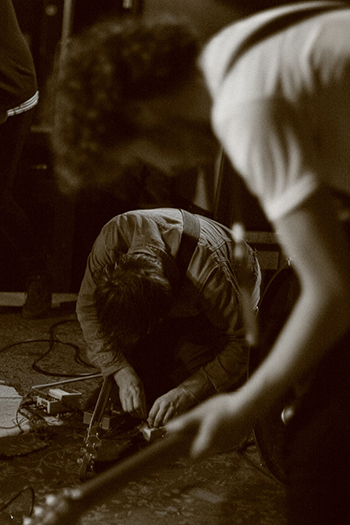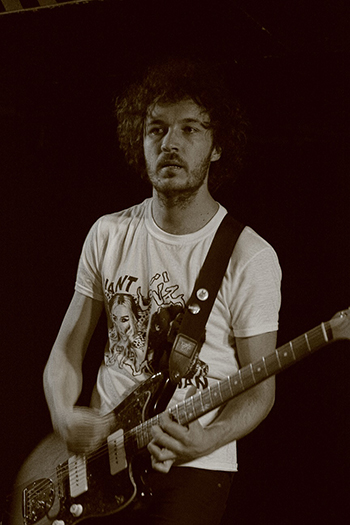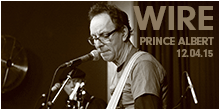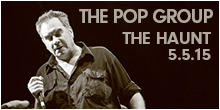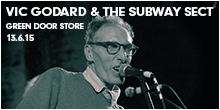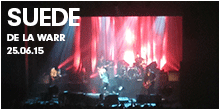

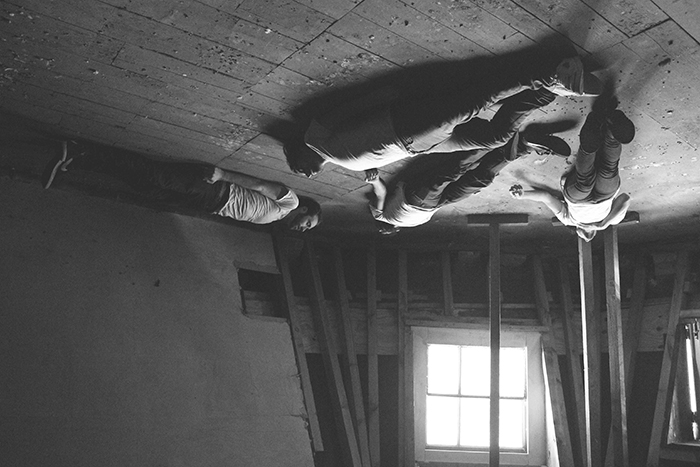
Spectres barge in ...
Joe Hatt and Andy Came talk to Adam Hammond about their brilliant debut album and that RSD controversy
It’s what Record Store Day has become: just another event in the annual music industry circus, co-opted by major labels and used as another marketing stepping stone ... U2 have already shat their album into our iTunes, why should they constipate the world’s pressing plants with it too? ... Because of the rules and regulations (minimum pressing amounts, no direct to customer sales, blah blah blah) Record Store Day really isn’t fun, and it’s certainly not beneficial to small, backs to the wall labels ... but we are still affected by it. Badly.
Amid the echoes of self-congratulatory backslapping and the chimes of overflowing cash registers, another Record Store Day came and went, filling eBay with overpriced excrement and leaving the major record labels wallowing in the cataracts of abundance. As they gorged themselves on plenty, it would have been easy for them to ignore a lone voice of protest from two small British independent labels whose complaints in reality mattered as little as a gob in the ocean, but not so. Any barbs aimed at the most holy cash cow needed to be ruthlessly stamped out and Sonic Cathedral and Howling Owl became the subject of much ridicule as the argument was dragged on to the national stage. Why, reasoned the minnows, who kept the pressing plants in work for 365 days a year, should their business be put on hold while the majors clogged up the chain of production making picture discs of A-ha records that could be bought for a few pence in any local charity shop? A moot point you would think, but there was to be no debate. RSD was the insulin that kept the lifeblood of the music industry stable; to question it bordered upon insanity. This, the majors sneered, was all a publicity stunt by two small labels desperate to sell a few records. Talk about missing the point. Sonic Cathedral couldn’t sell their latest release because they couldn’t get it re-pressed. And they needed it re-pressed because it had sold out on the day of its initial release with barely a whisper of publicity. What they needed were records, and how dare a record label need records in RSD month?
The album that caused all the fuss was Dying, the debut from Bristol-based four-piece Spectres, a record that flew out of the shops as quickly as it arrived. Sometimes it simply seems the time is right for a band who transcend all of the usual hype to find favour with the minimum of fanfare, and that was certainly the case for Spectres whose approach to their career had been anything but high profile. The band had pressed a hundred copies of their Hunger EP on their own Howling Owl label in 2013 and there had been 250 copies of ‘The Sky Of All Places’ single released by the Too Pure Singles Club in 2014, but that had been it. Spectres had played live, and featured in Wire’s DRILL festival, but the sheer impact made by Dying was as remarkable as it was unpredictable.
Andy: We were surprised about how much attention the album received, most of the reviews and press were amazing. The first pressing of the vinyl sold out on the day Dying was released and we were genuinely shocked. We were then told it would take three months for the re-press to arrive due to the clogging up of vinyl pressing plants because of the same old shit being reissued for RSD. We toured Greece in early April and couldn't take any copies of the album with us to sell because we didn't have any. It was definitely a hindrance. The whole point of the protest against RSD was to raise awareness that the music industry is controlled by the mainstream and was not helping the little guys like Spectres/Howling Owl and Sonic Cathedral get by. We were surprised at how much attention the statement got; they are still making their millions on reissue after reissue so why should they care?
Despite the encouraging reaction to Dying, this has been no overnight success for Spectres who fought for many years just to be heard, and who were even forced to leave their home town due to overwhelming indifference.
Andy: Three of us grew up in Barnstaple and everyone was into reggae and surf rock, no one liked the music we were into. We would play with bands who were nothing like us and crowds watching us would pay no attention and leave. This made us play our instruments harder and louder which has helped shape us into the band we are today. Moving to Bristol was essential and a big part of our DNA actually comes from living in Bristol. When we first moved there we got banned from venues for various reasons and were forced to go underground and put on our own shows. This created a great underground scene whereby lots of new friends were made and great Bristol bands met each other through shows that Howling Owl put on in weird spaces/diving schools/crypts. When we recorded the album we didn't expect anything and still don't. It has taken five years from when we first started for this album to come to fruition and it has been hard work. For years we played to no one, slept in vans and grafted for no reward and it does feel quite rewarding that people care. Despite all this we are still nobodies just trying to fight our way in the world. Nat from Sonic Cathedral booked our London show at The Lexington for the album tour and when he first mentioned that we should play there last year we thought he was crazy and it would be empty. In the end we sold it out and it was by far one of my favourite shows we have ever played. The tour was good and the crowds were great although we did only play to four people in Leeds.
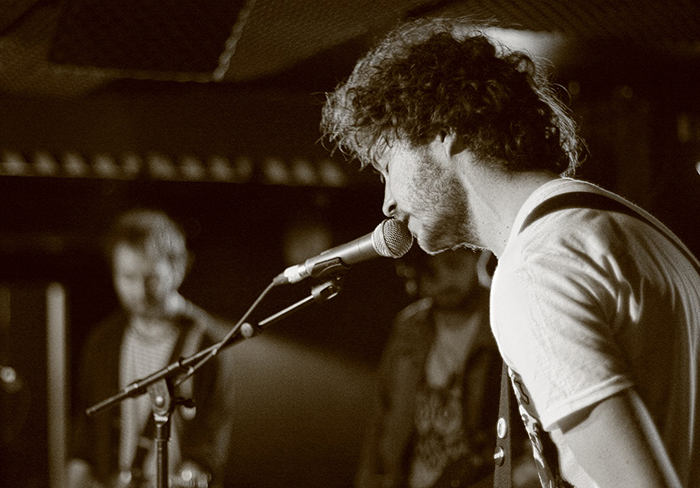
The unusual aspect of Spectres’ success is that their music is by no means accessible, being dark, difficult, dense, and deliberately confrontational. Inspired by a host of No Wave artists, the band fill their songs with sheets of noise, built layer upon dancing layer, and have talked of their desire for their music to drag audiences into their own personal black holes. Hell, the album itself is titled Dying, has a cover picture of a drowning man, and is themed around, well, death. And after the warning sirens of opener ‘Drag’ there is no let up from the dramatic sonic assault. Yet, Dying is no mere attack on the senses and Spectres are not a band to shout in a storm. Their use of noise is considered, textured and shaped to purpose. The incredible ‘This Purgatory’ both hums and howls, veering from the cries of whales in a boiling ocean to full throttle chainsaw massacre. It carries you tenderly before dropping you off a cliff. Spectres don’t use noise as a cudgel as did the noise terrorists in days of old, but as a multi-faceted instrument of torture, intended to break you in a variety of ways; this is creative stuff.
Joe: I wouldn't say that bands like us form noise into something more creative as I still think the whole No Wave movement is one of the richest periods of creativity, but I do agree that we harness it in different ways. There are still plenty of 'true' noise artists making statements through sheer abrasiveness and don't care about it being in any way accessible/enjoyable, but we enjoy the tease of lulling people in and then attacking them with feedback and sheets of noise. To be honest I don't think anyone has done that as well as Sonic Youth, and probably never will.
Well not until now, maybe. Just listen to the looping attack of ‘Mirror’ as it scratches out your heart and it is difficult to imagine even the most committed Youth enthusiast not nodding in appreciation. This really is a monster of a song, searing and penetrating before it passes away abruptly after three minutes with Joe Hatt’s dark vocals echoing in your brain, “Soon this concrete running through my veins will set and leave me in stone.” The lyrics throughout are unremittingly dark and were the last part of the album to be recorded.
Joe: The rest of the band genuinely didn't see or really hear the lyrics until the album came out due to our writing process. That involves me recording the music on a phone at practice and then playing the songs on repeat in my headphones and writing to them. It definitely wasn't a conscious decision for the album to have a theme running through it, it is just what came naturally due to scenarios happening around me at the time. My mum asked me if I needed counselling when she read the lyrics, I just told her it was all fiction ... ha ha! I think this band is a psychiatrist’s chair for all four of us.
Unsurprisingly, given the craft involved in shaping these songs with their painstakingly interwoven layers of sound, Spectres are not prolific writers, yet when they have discovered something they like they embrace it, nurture it, and guide it to maturity. These songs matter. Dying is not the pick of the crop, it’s the band heart, body and soul, with nothing spare.
Andy: Our songwriting process is a slow one as we only rehearse once a week for about three hours. It usually involves the four of us staring at the floor playing different things and then somebody will come up with something that we all like. We then piece together the song and get a structure from that idea which can take several weeks. When we recorded Dying we only had those ten songs; we aren't the sort of band who will write and record twenty and then choose the best ten or twelve.
Spectres expect the recording of their second album to be “long and hard” and it is unlikely they will approach the task with any less intensity than the first time around. Though such commitment clearly explains the unwavering quality of Dying, it can also come at a cost. The band’s music has grown ever more ferocious over the past couple of years, so how far can they take it? Is it even possible to better the warped fury of ‘Lump’ or the creeping threat of 'Blood In The Cups'? If Spectres look to outdo themselves every time they enter the studio, things could easily end very messily.
Andy: I think that is a reaction to what is going on around us and how we have grown as a band. We never say this needs to sounds like this or we have to make this bit sound horrible, it all comes naturally and the four of us all bring our own experiences from the outside world into the practice room.
Joe: I don't think we'd ever spend enough time in the studio for us to want to kill each other, which is maybe something we should address. The album was recorded in five days as we just do live takes and then the odd extra track but for the next one I think we're going to try and do the whole clichéd 'hire a cottage in the country' and write for a week, away from the internet and ban ourselves from our phones etc... and see what happens. Hopefully something terrible.
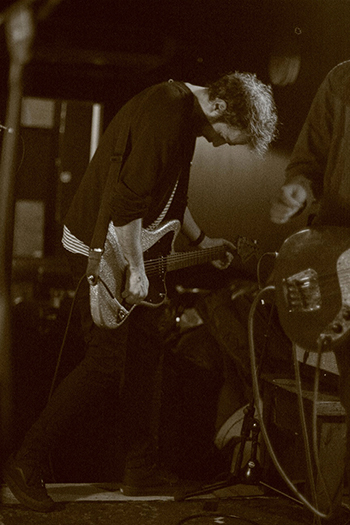
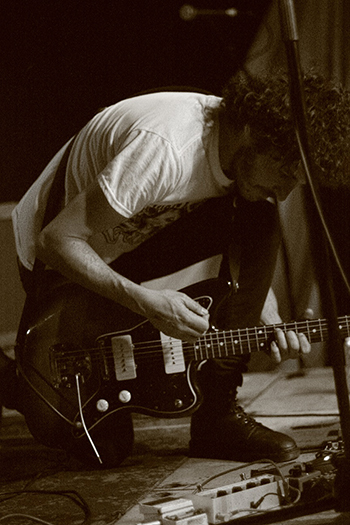
Although appreciative of any support, Spectres care little for the trappings of success, being far more concerned with developing their sound without any interference from outside sources. They claimed once they moved to Bristol and not London as they were ‘not aspirational’, but it’s clear the band do want to get their music heard, they just aren’t prepared to compromise on their approach.
Andy: We aren't the kind of band who care about ‘making it’ whatever that means. If someone likes our music and buys our record then that's great but we aren't going to ram ourselves downs people's throats. If you are a band that people like and care about then you will get noticed regardless of whether you are based in London or not. Bands who move to London spend more time worrying about how to pay their rent than actually writing songs which is of no benefit.
Their inability to compromise brought the band some unwelcome attention when they refused to be pressured into hosting Royal Blood when they were involved in gig promotion in their early days in Bristol. Spectres wouldn’t touch them because in their opinion the Brighton duo were, well, corporate shit. Such perception is laudable, as is the band’s determination to remain true to their philosophy; Spectres are self-sufficient, almost a cottage industry, and if something doesn’t tie in with their outlook then they won’t touch it, whatever the incentive. Indeed, it is refreshing to find a band who are influenced not just by the positive forces in their lives, but by the negative; a band whose rage at the sea of mainstream pap that is hurled at them only reinforces their resolve to be better, stronger, faster ...
Andy: Our inspiration mainly comes from bands who inspire us musically and also our attitude as a band. Sonic Youth and Fugazi are two big influences because of their DIY ethic. We have always done everything ourselves from designing/screen printing artwork to making zines to booking our own shows etc. As a band we want to keep our own identity and keep control over what we do. One of the best things about working with Sonic Cathedral is that they trust us completely to still have that control. Part of the anger in the music comes from the average bands/acts that pollute our airwaves everyday. It is not uncommon when we are on the road for us to listen Radio 1 and hear the chuff that is being pushed into people's ears by the mass mainstream. This inspires us to make our music more uncomfortable, darker and more disturbing. Royal Blood are essentially puppets in a boyband with instruments. There is so much money and people behind them they could have been found on one of those reality TV shows. No one will care about them in two years when the ‘next big thing’ appears that makes a moronic A&R guy wet himself. They are a prime example of everything we are against, everything Spectres has done has always been organic and if that ever changed we wouldn't be a band.
As the band continue to promote Dying, they will be appearing at a few summer festivals in the UK and Europe including Incubate, La Route Du Rock, Supernormal and Reverence. These will be followed by a European tour in September and a short UK tour in November of places they haven’t yet managed to reach. If you haven’t caught Spectres playing live, then make sure you do so, as watching them is something you will never forget. That may be because of your mad dash for the door, the consequent purchase of your first hearing aid, or just the thrill of seeing these consummate musicians create such stunningly addictive patterns of sound.
Andy: People can take our live show however they like. We appreciate fans who enjoy our music as much as people who can't stand it. If it makes someone smile then that's great, whether that be in a disturbed way or if they genuinely like it. We do like people appreciating what we are trying to create and there will be people who like the darkness and the ear battering. We also smile when someone leaves a show because they can't handle it or have a look on their face whereby they don't know what to do with themselves. We want people to pay full attention to what we are doing and not be distracted by anything else around them.
It’s difficult to imagine anyone being distracted when Spectres are playing, even by World War Three. Just put the album on and see for yourself. Dying is great; everyone should try it.
An edited version of this interview first appeared in Step On Magazine.
